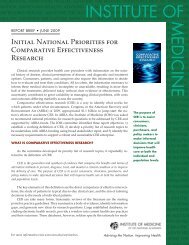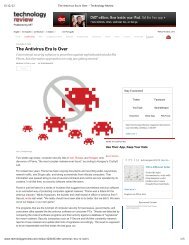You also want an ePaper? Increase the reach of your titles
YUMPU automatically turns print PDFs into web optimized ePapers that Google loves.
Figure 2. Economic Sentiment Indicator<br />
120<br />
100<br />
80<br />
60<br />
40<br />
20<br />
1.4 percent in 2011. In the last quarter <strong>of</strong> 2011, it experienced<br />
a negative growth <strong>of</strong> 0.3 percent. The European<br />
Commission expects a negative growth rate <strong>of</strong> 0.3 percent<br />
for the Eurozone in 2012, with a recovery <strong>of</strong> growth in the<br />
second half <strong>of</strong> the year.<br />
Current expectations, measured by the Economic<br />
Sentiment Indicator (ESI), are moderately optimistic.<br />
Economic sentiment is still considerably below its<br />
long-term average <strong>of</strong> 100, but it is recovering nonetheless<br />
(see figure 2). The ESI rose for a second consecutive month<br />
in February to 94.5, before decreasing by a marginal 0.1<br />
points in March. Beneath the surface, however, developments<br />
point to deepening growth differentials in the<br />
Eurozone. While Germany’s ESI stands at 104, the expectations<br />
for troubled Eurozone economies are still grim.<br />
Spain’s ESI is 91, Italy’s is 89, and Greece’s is 76.<br />
Germany’s situation is mirrored in the results <strong>of</strong> <strong>Deloitte</strong><br />
Germany’s first CFO survey. German CFOs feel that macroeconomic<br />
and financial market uncertainty is unusually<br />
high. They are also highly doubtful about the current and<br />
Eurozone<br />
0<br />
Jan ’07 Jan ’08 Jan ’09 Jan ’10 Jan ’11 Jan ’12<br />
Source: European Commission<br />
future stability <strong>of</strong> the Eurozone as well as the effectiveness<br />
<strong>of</strong> the Eurozone’s political crisis management. However,<br />
they show moderate optimism when it comes to their own<br />
business outlooks.<br />
Growth differentials and two-tiered economic performance<br />
are dangerous because they reinforce the substantial<br />
difference in competitiveness between Eurozone nations.<br />
While the European Monetary Union was meant to lead<br />
to convergence in economic performance, the reverse has<br />
actually occurred, and economic performance and expectations<br />
continue to diverge. Neither growth patterns nor<br />
unit labor costs, one <strong>of</strong> the main indicators for competitiveness,<br />
have shown convergence in the Eurozone in the<br />
last decade (see figures 3 and 4).<br />
Greece: Too much debt, not enough growth<br />
Until a few years ago, Greece was one <strong>of</strong> the fastestgrowing<br />
European economies. From 2001 to 2007, its GDP<br />
grew on average by 4.1 percent per year. The Eurozone<br />
as a whole grew by 2 percent, and Germany grew by only<br />
1.4 percent. As it turned out, after the financial crisis, this<br />
Geographies<br />
Germany<br />
France<br />
Euro area<br />
Spain<br />
Italy<br />
Greece<br />
9











